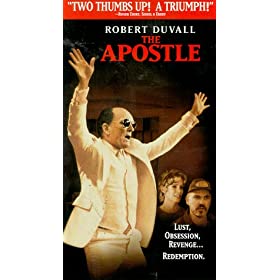Fallen Leaders Redeemed: Why Ted Haggard’s Story Wouldn’t Make a Good Movie

In addition to presenting an almost anthropological look at Southern Pentecostalism — “praise JEEZ-zus!” — the film offers a meditation on human personality. How can this preacher, Eusliss “Sonny” Dewey be so prayerful, so inspired, so…likable, and yet so guilty of serious sin?
The movie opens with Sonny happening on the scene of a roadside accident, where he sneaks past police to the wreckage, looking for battered souls to win for Christ. Isn’t it quite outrageous to chase ambulances looking for converts? But the depth of Sonny’s faith — and the obvious gratitude from the young man teetering on the edge of death — makes the viewer look beyond, to love something about Sonny’s spontaneous, full-blooded and utterly doubt-free connection with the Almighty.
This very same man who leads worshipers on Sunday morning to near-ecstatic levels of faith has “womanizing ways,” and a bitter wife to prove it. When Sonny discovers his wife is having her own affair and taking over leaderships of his church, Sonny stays up all night shouting and talking with God (”I love you, Lord, but I’m mad at you!”) Alas, this release valve does not resolve his feelings: He takes a baseball bat and bashes his wife’s lover in the head, killing him. On the run from the law, Sonny baptizes himself as an apostle and builds a church in a tiny Louisiana town grateful for his energy, optimism and electric preaching.
The movie ends, of course, with the police pulling up to his church, where he says his tearful yet cheerful good-byes, leaving behind his watch and wedding ring to be pawned to support the church.
Roll credits, and we see Sonny as a convict, working on a chain-gang on the side of a dusty Southern road, leading his fellow convicts in a Jesus chant: “Yea, though I walk through the valley, who is my savior?” The men grunt: “Jesus!” As much as the viewer doesn’t want Sonny to suffer, it feels inevitable, even right, that he must spend his time in jail — Sonny himself seems to accept his punishment.
Why is this image of Sonny, the still-faithful convict, so much more satisfying, narratively speaking, than that of disgraced evangelical pastor Ted Haggard, currently working toward a master’s degree in psychology at his new home in Phoenix?
When it comes to stories of redemption, the guilty protagonist wins back sympathy by taking his medicine. Haggard has been fired from his jobs and publicly shamed, yes, but he is not facing any criminal charges for his behavior, which allegedly included hiring a prostitute and buying drugs. Although Haggard is surely grateful not to be facing even the potential of jail time, he may also be missing an opportunity to create a satisfying tale of redemption. Just as Chuck Colson.

Pingback by What Makes a Movie “Christian?” Q+A on new Veggie Tales movie | ReligionWriter.com on 8 January 2008:
[…] has to stand apart that much from a really well-told film, like a Finding Nemo or The Mission or The Apostle. There are so many films that have compelling messages with spiritual implications. When Christian […]